

Jonathan Wild. Jonathan Wild (1682/3 – 24 May 1725) was a London underworld figure, notable for operating on both sides of the law, posing as a public-spirited crimefighter, titled ‘Thief Taker General’.
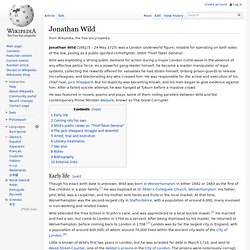
Wild was exploiting a strong public demand for action during a major London crime wave in the absence of any effective police force. As a powerful gang-leader himself, he became a master manipulator of legal systems, collecting the rewards offered for valuables he had stolen himself, bribing prison-guards to release his colleagues, and blackmailing any who crossed him. He was responsible for the arrest and execution of his chief rival, Jack Sheppard. But his duplicity was becoming known, and his men began to give evidence against him.
The Newgate Calendar - JACK SHEPPARD. A Daring Housebreaker, who made Ingenious Escapes from Prison and even tried to foil his Executioner at Tyburn on 16th of November, 1724.
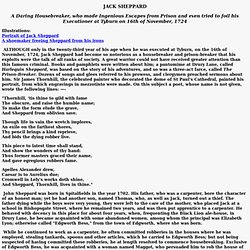
Www.gutenberg.org/cache/epub/5256/pg5256.html. The Project Gutenberg EBook of The History of the Life of the Late Mr.
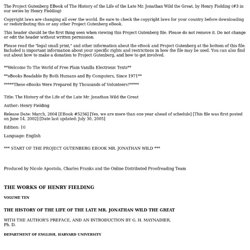
Jonathan Wild the Great, by Henry Fielding (#3 in our series by Henry Fielding) Copyright laws are changing all over the world. Be sure to check the copyright laws for your country before downloading or redistributing this or any other Project Gutenberg eBook. This header should be the first thing seen when viewing this Project Gutenberg file. Please do not remove it. Joseph Blake (criminal) Joseph "Blueskin" Blake (baptised 31 October 1700 – 11 November 1724) was an 18th-century English highwayman and felon.
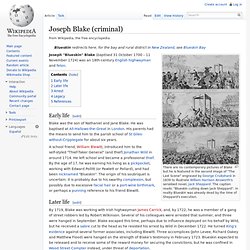
Blake was the son of Nathaniel and Jane Blake. He was baptised at All-Hallows-the-Great in London. His parents had the means to send him to the parish school of St Giles-without-Cripplegate for about six years. A school friend, William Blewitt, introduced him to the self-styled "Thief-Taker General" (and thief) Jonathan Wild in around 1714. He left school and became a professional thief. Jack Sheppard. Jack Sheppard or known as John Sheppard (4 March 1702 – 16 November 1724) was a notorious English robber, burglar and thief of early 18th-century London.
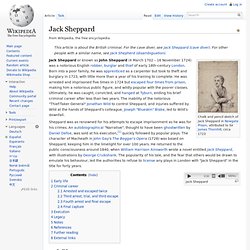
Born into a poor family, he was apprenticed as a carpenter but took to theft and burglary in 1723, with little more than a year of his training to complete. He was arrested and imprisoned five times in 1724 but escaped four times from prison, making him a notorious public figure, and wildly popular with the poorer classes. Nikola Tesla. Nikola Tesla (Serbian Cyrillic: Никола Тесла; 10 July 1856 – 7 January 1943) was a Serbian-American[3][4] inventor, electrical engineer, mechanical engineer, physicist, and futurist who is best known for his contributions to the design of the modern alternating current (AC) electricity supply system.[5] Born and raised in the Austrian Empire, Tesla received an advanced education in engineering and physics in the 1870s and gained practical experience in the early 1880s working in telephony and at Continental Edison in the new electric power industry.
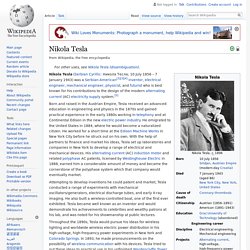
He emigrated to the United States in 1884, where he would become a naturalized citizen. He worked for a short time at the Edison Machine Works in New York City before he struck out on his own. With the help of partners to finance and market his ideas, Tesla set up laboratories and companies in New York to develop a range of electrical and mechanical devices. Early years Tesla's baptismal record, 28 June 1856 Working at Edison.
Nikola Tesla. Nikola Tesla Pretty much everybody even remotely associated with real-time strategy games has heard the name Tesla before – the Serbian God of Lightning's omnipresent, ever-zapping coils have been ruining the lives of digital Allied soldiers and gibbing U.S. war machines into spare parts since the release of Command & Conquer: Red Alert in 1996 – but surprisingly few people these days are familiar with the life and times of one of humankind's most eccentric, badass, and volumetrically-insane scientific super-geniuses.
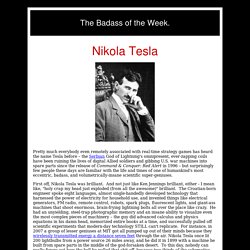
First off, Nikola Tesla was brilliant. And not just like Ken Jennings brilliant, either - I mean like, "holy crap my head just exploded (from all the awesome)" brilliant. Why Nikola Tesla was the greatest geek who ever lived. Additional notes from the author: If you want to learn more about Tesla, I highly recommend reading Tesla: Man Out of Time Also, this Badass of the week by Ben Thompson is what originally inspired me to write a comic about Tesla.

Ben's also got a book out which is packed full of awesome. There's an old movie from the 80s on Netflix Instant Queue right now about Tesla: The Secret of Nikola Tesla. Buster Keaton. Joseph Frank "Buster" Keaton (October 4, 1895 – February 1, 1966) was an American comic actor, filmmaker, producer and writer.[1] He was best known for his silent films, in which his trademark was physical comedy with a consistently stoic, deadpan expression, earning him the nickname "The Great Stone Face".[2] Buster Keaton (his lifelong stage name) was recognized as the seventh-greatest director by Entertainment Weekly.[3] In 1999, the American Film Institute ranked Keaton the 21st-greatest male star.[4] Critic Roger Ebert wrote of Keaton's "extraordinary period from 1920 to 1929, [when] he worked without interruption on a series of films that make him, arguably, the greatest actor-director in the history of the movies.
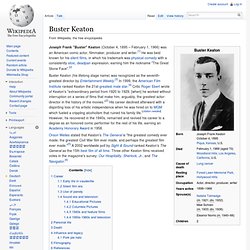
"[2] His career declined afterward with a dispiriting loss of his artistic independence when he was hired on to MGM which fueled a crippling alcoholism that ruined his family life. Career[edit] Early life in vaudeville[edit] Silent film era[edit] The Films of Buster Keaton. The greatest of the silent clowns is Buster Keaton, not only because of what he did, but because of how he did it.

Harold Lloyd made us laugh as much, Charlie Chaplin moved us more deeply, but no one had more courage than Buster. I define courage as Hemingway did: "Grace under pressure. " In films that combined comedy with extraordinary physical risks, Buster Keaton played a brave spirit who took the universe on its own terms, and gave no quarter.
Buster Keaton. Charlie Chaplin and I would have a friendly contest: Who could do the feature film with the least subtitles? Joseph Frank Keaton VI (4 October 1895 – 1 February 1966) was American actor and filmmaker, often called The Great Stone Face, he was the first person ever called "Buster", acquiring the nickname from Harry Houdini who saw him take a fall down some stairs as an infant. Quotes[edit] We used to get arrested every other week — that is, the old man would get arrested. Quotes about Keaton[edit] There are people that never much cared for Keaton. The Great Buster Keaton. Robert Johnson. Johnson's records sold poorly during his lifetime. It was only after the reissue of his recordings in 1961 on the LP King of the Delta Blues Singers that his work reached a wider audience.
Johnson is now recognized as a master of the blues, particularly of the Mississippi Delta blues style. He is credited by many rock musicians as an important influence; Eric Clapton has called Johnson "the most important blues singer that ever lived. "[1][2] Johnson was inducted into the Rock and Roll Hall of Fame as an "Early Influence" in their first induction ceremony in 1986.[3] In 2003, David Fricke ranked Johnson fifth in Rolling Stone′s list of the 100 Greatest Guitarists of All Time.[4] Life and career[edit] Early life[edit] Robert Johnson was born in Hazlehurst, Mississippi possibly on May 8, 1911,[5] to Julia Major Dodds (born October 1874) and Noah Johnson (born December 1884). Circa 1919, Robert rejoined his mother in the Mississippi Delta area around Tunica and Robinsonville. Death[edit] Did Robert Johnson really sell his soul?
Robert Johnson sold his soul to the devil in Rosedale, Mississippi. Last month, while I was driving down the Mississippi River on a magazine assignment, I had a curious experience in Rosedale, Mississippi. As I was eating lunch in a place called Leo’s Market, a waitress mentioned that Rosedale is the place where the legendary bluesman Robert Johnson sold his soul to the devil in exchange for musical genius (an event alluded to in — among other places — the Cohen brothers’ movie Oh Brother, Where Art Thou). As if to prove it, the waitress handed me a wrinkled, typewritten transcription of a “vision” about Johnson’s fateful moment that had appeared to bluesman Henry Goodman as he was traveling the road from Rosedale to Anguila.
For the sake of posterity (and because I have never seen it elsewhere), I am publishing Goodman’s “vision” in full below, as well as a postscript by Rosedale’s Crossroads Blues Society. “Lord, I’m goin’ to Rosedale,” he wails, “gon’ take my rider by my side.” The Robert Johnson Notebooks. On November 23, 1936, Robert Johnson recorded his songs for the first time in San Antonio, Texas.
This first of two sessions was unceremoniously squeezed between W. Lee O'Daniel & His Hillbilly Boys the day before, and Hermanas Baraza con Guitarras the day after. Yet out of this modest recording session, after which Robert Johnson collected his money and disappeared again into the Mississippi Delta, came a powerful and unique sound which forever changed music in America.
The vitality of Robert Johnson's music has been reaffirmed by the many remakes of his songs, from such diverse artists as Lee Roy Parnell to Eric Clapton to the Red Hot Chili Peppers.